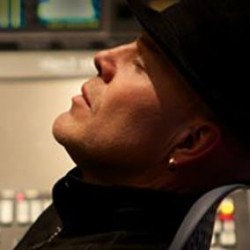
Johns Hopkins University has announced that synthpop pioneer Thomas Dolby is joining their faculty as the first ‘Homewood Professor of the Arts’.
At Johns Hopkins, starting in the fall, he will be teaching ‘Sound on Film’, a collaboration between Homewood’s Film and Media Studies program and Peabody’s Recording Arts and Sciences program. In the programe, students create soundtracks for films.
Dolby will also be the artistic director of the Program in Sound on Film at Station North, helping to lead the university’s efforts in Baltimore’s arts and entertainment district.
“There’s a family of arts industries that all use digital technologies,” says Dean Katherine S. Newman. “We’re trying to create what I think of as a Silicon Valley for the arts.”
About Thomas Dolby
With the 1982 release of his first album, The Golden Age of Wireless, Dolby became an unlikely pop star. His quirky video for the single “She Blinded Me With Science” was played in heavy rotation in the early days of MTV. In The New York Times, Stephen Holden once called the single a “pop tone poem.”
Dolby released four acclaimed albums in the first 10 years of his solo career. The last of these, 1992’s Astronauts and Heretics, was one of the first major studio albums to be completely engineered using a Macintosh home computer.
In 1994, Dolby founded Headspace, Inc. and created the Beatnik audio engine, an early software synthesizer. The product was designed as a component for video games, and Dolby immediately saw its potential for use in early web browsers. While working with the founders of Netscape, Dolby licensed Beatnik to Sun Microsystems for use in the Java programming language. Beatnik came to the attention of Nokia engineers, who sought a sound solution for their mobile phones. Ultimately, ringtones proved the most robust market for the Beatnik audio engine, and by 2005 Dolby’s technology was in more than half of the world’s mobile phones.
Over two decades, Dolby adapted his musical vision to feature films, video games, and electronic sound technology. He has written scores for films by Ken Russell and Richard Brooks, and his music has been featured in dozens of films and television shows, from “Mission Impossible III” to “Breaking Bad.”
Dolby served as musical director for the TED (Technology, Entertainment, Design) conferences from 2001 to 2012. Last year, he toured the U.S. performing a live soundtrack to his award-winning documentary short, The Invisible Lighthouse, which he shot, scored, and edited himself.
Dolby’s position at Johns Hopkins is supported by a grant from The Andrew W. Mellon Foundation.
via aymat

I am surprised he isnt teaching SCIIENCE!
SCIENCE!
Since it’s Johns Hopkins, perhaps the department of opthalmology.
It’s stated what he is teaching in the second sentence of the article above, and it definitely is not ophthalmology.
Thomas Dolby is a genius in music and music communication to put it mildly. Please do absolutely everything possible to affirm and support Mr. Dolby at Johns Hopkins as a Professor, and as an absolute gift past, present and future (for eons even to come in my opinion) to Baltimore, the USA #1, the English speaking world and to the world generally. This man is the definition of exceptional and genius in our midst. I can’t believe that God would have him in the USA – the world does not recognize and affirm genius – good play, yes, genius of thought, courage and presentation, no. Do not cause any undue trial or misfortune for this man. Learn from him and support his creative work and mission. YOU are the luckiest John Hopkins. Surround Mr. Dolby professionally with some USA, not of the selfish and really average in every way as people international faire, surround him with some genuine USA intellectual colleagues and some loyal and motivated workers. God bless you Tom Dolby and Family.” by Lance Foss 05/29/14